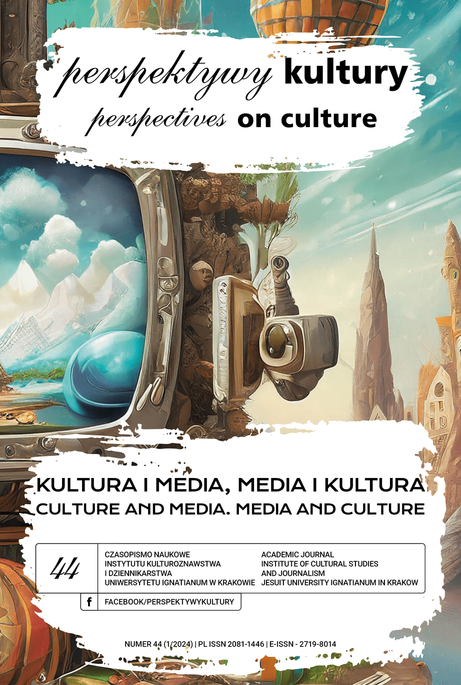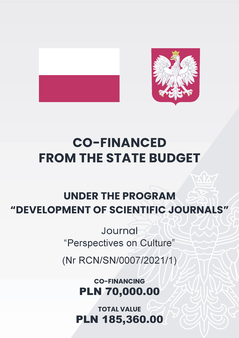Strategies for Selecting Personal Sources by Jurnalists
Cognitive Authority versus Expertise. Diagnosis and Proposal for Process Enhancement
Abstract
The focus of this article revolves around the strategies employed by journalists in selecting personal sources. The objective is to delineate variances in methodologies and criteria utilized for choosing individuals embodying cognitive authority and expertise, as per P. Wilson’s theoretical framework. Utilizing a questionnaire-based approach, the research was conducted among journalists specializing in cultural affairs across radio and television editorial departments as well as online platforms. The study delineates the pathways utilized in selecting cognitive authorities and experts for journalistic endeavors, offering insights into potential enhancements for these selection processes.
References
Babik, W. (2016). Ekologia informacji : zadania w społeczeństwie informacji i wiedzy. W: nspiracje i innowacje : zarządzanie informacją w perspektywie bibliologii i informatologii. Kraków: BJ, s. 71-79.
Bar-Tal, Y., Stasiuk, K., Maksymiuk, R. (2018). What makes you think that you are a health expert? The effect of objective knowledge and cognitive structuring on self-epistemic authority. Advances in Cognitive Psychology, Vol. 14.4, pp. 186-191.
Cisek, S. (2018). Koncepcje progowe (threshold concepts) w kształceniu kompetencji informacyjnych w szkole wyższeJ. BiBliotheca Nostra. Śląski kwartalnik naukowy, Nr 2 (52), s. 47-59.
Farrow, R., Moe, R. (2019). Rethinking the role of the academy: cognitive authority in the age of post-truth. Teaching in Higher Education, Vol. 24, Issue 3, pp. 272-287.
Hertzum, M. (2022). How do journalists seek information from sources? A systematic review. Information Processing & Management, Vol. 59.6, https://www.sciencedirect.com/science/article/pii/S0306457322001881 [dostęp: 07.06.2023]
Hirvonen, N., Tirroniemi, A., Kortelainen, T. (2019). The cognitive authority of user-generated health information in an online forum for girls and young women. Journal of Documentation, Vol. 75.1, pp. 78-98.
Jaskowska, M. (2020). Publiczne systemy informacyjne i źródła danych. Przewodnik. Kraków: BJ.
Krakowska, M. (2022). Diagnozowanie przestrzeni informacyjnej (information space) z perspektywy zachowań informacyjnych człowieka. W: Diagnostyka w zarządzaniu informacją : perspektywa nauk o komunikacji społecznej i mediach w kontekście rozwoju badań interdyscyplinarnych. Kraków: BJ, s. 121-154.
Liu, Jiqun, et al. (2019).Exploring the immediate and short-term effects of peer advice and cognitive authority on Web search behavior. Information Processing & Management, Vol. 56.3, pp. 1010-1025.
McKenzie, P. J. (2003). Justyfying cognitive authority decisions: discursive strategies of information seekers. The Library Quarterly, Vol. 73, pp. 261-288.
Moura, M. A., Tavares de Paula, L. (2020). Cognitive Authority, Accountability, and the Anatomy of Lies: Experiments to Detect Fake News in Digital Environments. In: Navigating Fake News, Alternative Facts, and Misinformation in a Post-Truth World. IGI Global, pp. 259-272.
Multas, A-M., Hirvonen, N. (2021). “Let's keep this video as real as possible”: young video bloggers constructing cognitive authority through a health-related information creation process. Journal of Documentation, Vol. 78.7, pp. 42-64.
Rieh, S. Y (2005). Cognitive authority. In: Theories of information behavior. Medford: Information Today.
Skibińska, M. (2021). Kompetencje informacyjne–przegląd tendencji rozwojowych koncepcji information literacy. Przegląd Badań Edukacyjnych (Educational Studies Review), Nr 34, s. 181-207.
Wilson, P. (1983). Secon-hand knowledge: an inquiry into cognitive authority. Westport: Greenwood Press.
Copyright (c) 2024 Ignatianum University in Cracow

This work is licensed under a Creative Commons Attribution 4.0 International License.
Autor, zgłaszając swój artykuł, wyraża zgodę na korzystanie przez Wydawnictwo Uniwersystet Ignatianum z utworu na następujących polach eksploatacji:
- utrwalania utworu w formie papierowej, a także na nośniku cyfrowym lub magnetycznym;
- zwielokrotnienia utworu dowolną techniką, bez ograniczenia ilości wydań i liczby egzemplarzy;
- rozpowszechniania utworu i jego zwielokrotnionych egzemplarzy na jakimkolwiek nośniku, w tym wprowadzenia do obrotu, sprzedaży, użyczenia, najmu;
- wprowadzenia utworu do pamięci komputera;
- rozpowszechniania utworu w sieciach informatycznych, w tym w sieci Internet;
- publicznego wykonania, wystawienia, wyświetlenia, odtworzenia oraz nadawania i reemitowania, a także publicznego udostępniania utworu w taki sposób, aby każdy mógł mieć do niego dostęp w miejscu i czasie przez siebie wybranym.
Wydawca zobowiązuje się szanować osobiste prawa autorskie do utworu.






